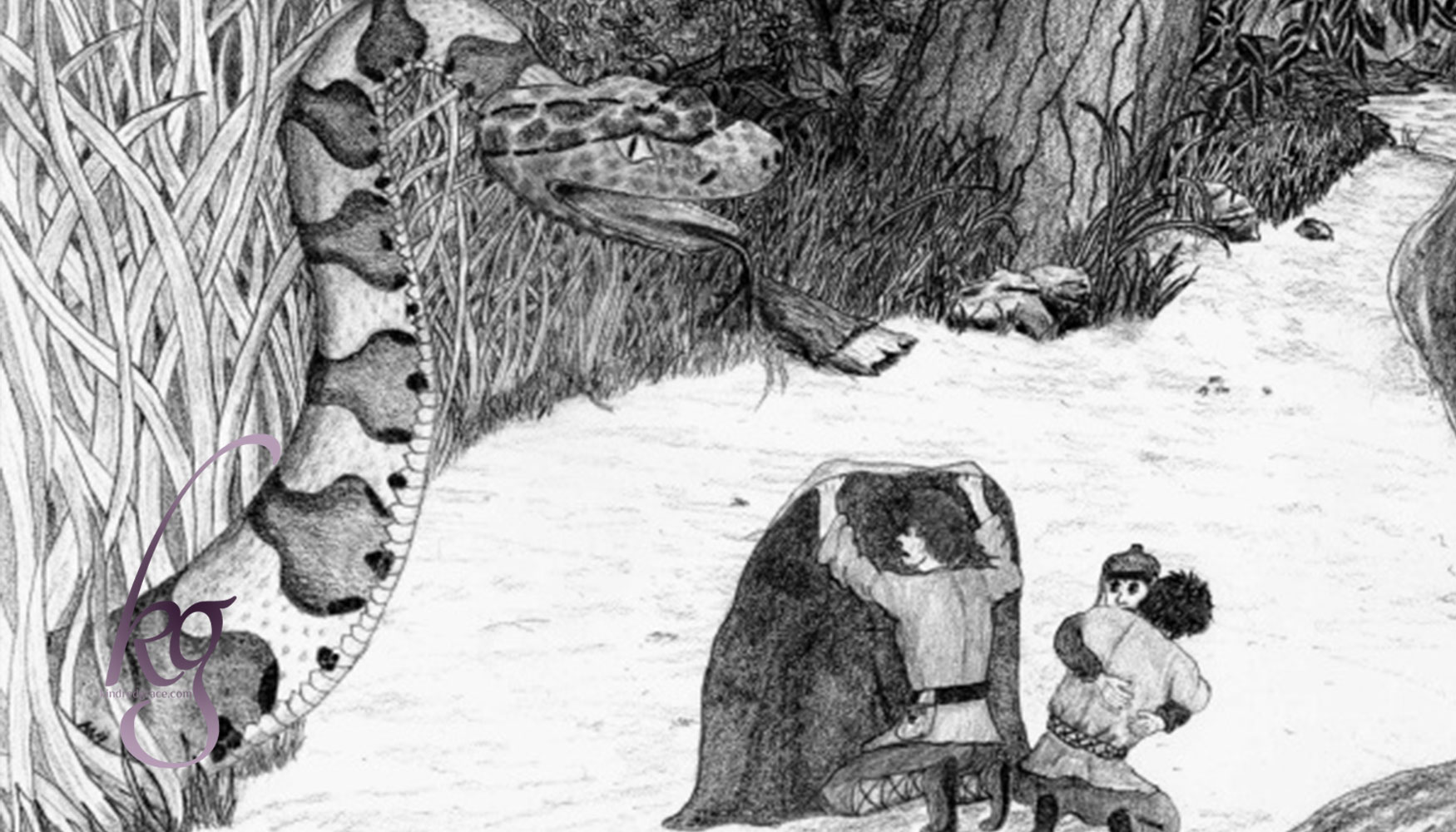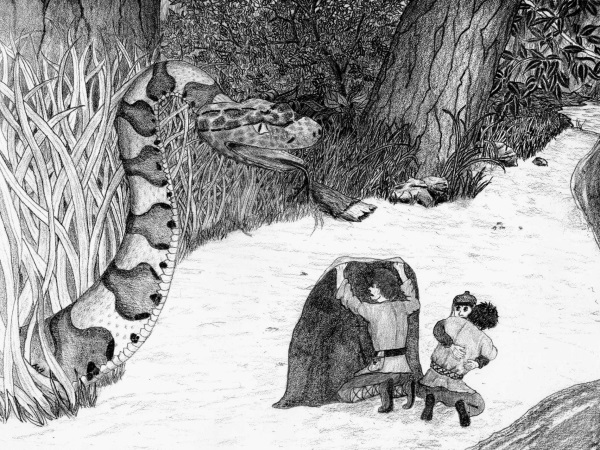Faith and Fantasy: One Inch Tall for Jesus
Disclosure: This post contains affiliate links which won’t change your price.
My dad, Alan W. Harris, has an alter ego. By day, he is a mild-mannered small-animal veterinarian and homeschool father, ridding the world of parvovirus and ignorance, one puppy and child at a time. But by night, usually after the rest of the family is in bed, Dad writes fantasy fiction, crafting near-death experiences, laughter-inducing chaos, and tear-jerking moments.
Dad started writing as a hobby, but it became a family ministry. Now Dad has published two novels and is working on his third. I could spend many more paragraphs telling you about the delightful books Dad has written (and is still writing!), but I think I’ll let Dad tell you about himself in this exclusive interview for Kindred Grace.
An Interview with Alan W. Harris
Natalie: First, tell us a bit about yourself as a person. How would you describe yourself?
Alan: First of all, I would describe myself as a follower of Jesus Christ. He has faithfully led me to places of blessing that I would have never chosen myself. I consider myself one of the most blessed men on earth.
I am fifty-nine years old and have been married to my best friend for over thirty-seven years. We have six children and, soon to be, five grandchildren. My wife Valerie and I have been homeschooling our children for twenty-two years. I am also a practicing veterinarian in West Columbia, South Carolina. I enjoy walks in the woods, watching things grow, doing creative things, playing racket ball or ping-pong with my sons, making family movies, and laughing. My two oldest sons and I have recently taken up underwater fossil hunting. That wasn’t my idea, but it turned out to be a lot of fun.
What made you pick up the pen originally?
The creative side of my brain demands to be released in some way every so often. After doing so much veterinary work or work around the house, I get this strong urge to create something. I’ve always been that way. As a younger man I was not disciplined enough to stick with one thing, so I tried all sorts of ways to satisfy my creative side. I was better at some than at others, but I never stayed with any one of them for very long.
When we were living in Auburn, Alabama, where I was in veterinary school, I was walking through the woods and discovered a creek cascading over a small three-step waterfall. There was a small hole in one of the rocks nearby. I thought to myself that if I was only an inch tall, I could climb in it and go exploring. Then I began to think what it would be like to only be one inch tall and trying to survive in the woods. Pretty soon my imagination began to run wild with that idea.
After writing about fifty pages of my story I had to stop due to the demands of vet school. Several years later, when we were having a family story-telling night, my oldest daughter Lisa remembered it and wanted me to read it. All of the kids enjoyed it so much that we kept reading it a little each evening until I had read all of my fifty pages. The children literally begged me to write more. So I did.
Every time I would finish a chapter we would have a special family night, and then I would read the next chapter. I even made up voices for the different speaking characters in the story just to make it more fun. Even now with my three older children married with families of their own, they still want to be a part of the family Larkin nights. We have to be creative to include everyone: we often have to use cell phone calls or Skype with everyone living so far apart. So it was really my children who motivated me to start writing in earnest.
You’ve written two fantasy adventure novels. How did they start?
I’ve already talked about how I began writing the first story Hawthorn’s Discovery. I actually thought of my second story, Larkin’s Journal, as I was writing the first one. There are a couple of chapters in the first book that deal with a little bit of the history of the Larkin people. I spent so much time thinking about Larkin the Great and how he found out about the Maker and His Son Jehesus that I decided, if I ever wrote a second book, it would be about Larkin and his journeys.
What are your writing plans for the future?
At present, I am about half way through writing my third book called The Great Gathering. This book takes up the lives of the characters of the first book, but about two years later. The Larkin clans are getting ready for the big reunion for all the clans. This happens every five years. The Makerians, who are a tribe of people who are devoted to the Maker and His Son Jehesus and whose existence is unknown to most of the Larkin, have decided to attempt to secretly infiltrate the Great Gathering with a few of their people. Their goal is to covertly share the good news of salvation in Jehesus Christ with whoever will listen to them. They will need the help of the few secret believers in the Larkin clans to accomplish this. If they are caught by the Shamans, who are the leaders of the Larkin clans, then the Makerians and those who help them will be imprisoned and possibly killed.
It’s been a lot of fun to write because I have needed to introduce several new and interesting characters that have been fun to create and write about. So far my family has been quite pleased with the story, but we’re just getting to the really exciting part.
My children have already come up with another story line involving the Larkin people that they want me to write about. So once I finish the third book, the fourth one has already been commissioned.
What has been your favorite writing project to work on?
I have really enjoyed writing all three of the stories. The first one took so long to finally complete that I started feeling like the characters were part of our family. It was amazingly satisfying to finally complete that first book. But I would have to say that I had more fun writing the second book, Larkin’s Journal. Between the two finished books, I have to admit that the second book is my favorite. I think I did a better job drawing the pictures for it as well.
You’re not only an author, but you’re a full-time veterinarian, husband, homeschooling father, and now grandparent. How do you find time for it all, and what would you say your average day as an author looks like?
Well, as far as finding time, it helps a lot that we don’t watch television. I also determined years ago that I would not let my writing interfere with family time. Therefore, my writing day usually doesn’t get started until everyone else has gone to bed. And because I usually have to be at the clinic early the next day, I don’t have a lot of time to write even then. Sometimes on my days off or at slow times at the clinic, I will try to write some. There is no way that I have time to write every day. Honestly, with my other commitments there are sometimes weeks between my writing times. I’ve learned not to get overwhelmed by the thought of writing an entire book, but rather just keep plugging away, line by line, and paragraph by paragraph. If I just stay with it, I’m able to keep producing chapters and eventually a book.
I hope some aspiring writers will be encouraged by this. Even though I have never been able to be consistent with the time I put into writing, by simply keeping at it, I have been able to produce two and a half books so far. My advice to those of you who want to write is, if you can’t be consistent, be persistent.
What inspired you to keep going? How did the novels evolve from a personal project to family enrichment?
Once I began writing in earnest, my purpose was always first and foremost for my own family. I always hoped that others would enjoy the stories as well, but the only opinions that really matter to me are those of my children. Not only did I want to entertain my children with an exciting story, but I also discovered that the story was an excellent way to teach my children some important spiritual and moral lessons. I got to show them the supreme value of knowing and following Christ. I was able to reveal to them the power and importance of prayer. I could vividly describe to them the consequences of having poor character, as well as the benefits and blessings of having godly character.
What do you like to read?
I would have to say that after the Bible, I mostly read nonfiction books about history. I especially enjoy books about people in history who showed outstanding character in their lives. I’m in the process of reading three books right now: one on George Washington’s spy network, an autobiography of Ulysses S. Grant, and a book on the life of Kit Carson and the history of the American Southwest.
What are your favorite books (of any kind) to recommend?
The Bible! I try to spend time every day in God’s Word. If you want God to influence your writing then you need to be regularly letting Him speak to you through His word.
All of C.S. Lewis’ Narnia books are well written and worth reading. They are definitely family favorites.
I’ve read a couple of Brian Jacques Redwall books, and while they don’t have the spiritual leaning that I would prefer, I think Mr. Jacques was a masterful storyteller. I especially like the way he used two or more separate plots going on at the same time in his books to keep the reader’s interest. Those of you who have read my books will notice that I used that technique in my first book. I am employing it in a limited way as I write my third book.
The book Mountain Man by Vardis Fisher was a book that was well written and an enjoyable read. It definitely stirred my fascination with stories about surviving the dangers in the wilderness.
This next one isn’t a very manly one to go on my list, but I think Janette Oke is a very good author. Her books are engaging and very readable. We read her series Love Comes Softly as a family years ago, and we were all very touched by it. She is very good at putting her message in a story form that easily gets to your heart.
What do you think are great traits that every book should have?
As far as books of fiction are concerned, I think it is important to have remarkable, if not fascinating, characters. An interesting story helps a lot, but you can even tell a mediocre story with interesting and engaging characters, and it can still be a success.
Since God is the One Who gave us the ability to imagine and tell stories, then we should use those abilities to honor Him. I believe that a good book should reveal to the reader something about God and should draw the reader closer to God. If my story doesn’t do that, then I personally feel that I’ve failed as a writer and have wasted my readers’ time.
What advice would you give to other new authors hoping to publish?
Don’t let yourself get discouraged. Even if traditional publishing companies are not interested in your work, that doesn’t have to stop you. In this day and age, it is relatively easy and not very expensive to self-publish your stories. Marketing can be a challenge, but connecting with other self-publishers can be very helpful. Most people who have pursued self-publishing their books seem to be willing to help others along the path. I have greatly appreciated the help and encouragement that I’ve received.
For many who are looking to publish their writing, blogging seems to open a lot of doors to that end. By blogging they try to create a following, a tribe. Later they might enlist the aid of their tribe to help them launch their self-published book on Amazon. It takes time, patience, and a lot of work, but many have done it.
Your novels are both openly Christian. What are your thoughts on spreading the Gospel through fiction?
I heard Dr. Michael Farris say one time that the person who tells the best stories shapes the culture. I believe that Christians need to be the ones telling the best stories. I don’t believe that my stories are the best ones out there, but I do believe that they are good stories, and anyone who reads them will be confronted with Jesus Christ, His words, and the life-changing impact He wants to make in a person’s life. Jesus Himself was constantly telling people stories to get His message across. Even Nathan the prophet used a gripping story to convict King David of his sin in 2 Samuel 12. If you tell a good story that engages the reader, then you can get your message all the way into a person’s heart, and that can be life-changing.
For more information about Alan W. Harris and The Tales of Larkin series, visit Stories Change Hearts.
Illustrations from The Tales of Larkin by Alan W. Harris




A great book must have a moral lesson for the reader woven in the story line
How encouraging! We need more books like this; books that will not only discard the world’s lies but replace them with practical truth. It looks like a great resource.
Great interview! I enjoyed it immensely. 🙂
I agree with Lydia: Biblical Truth. Especially if it’s fiction. There is so many books out there that don’t really help you or push you toward God. In fact, many of them simply hinder a person or are almost useless.
Biblical truth – I just love to read books that declare Biblical truth in a bold, passionate way.
Love the advice of being persistent even when you can’t be consistent. Thank you for this peek into your life as a writer.
A great book must be more than “fluff”. When I walk away from a great book, I’ve either learned a lesson(s), or looked at something from a different perspective, or it has caused me to THINK. 🙂